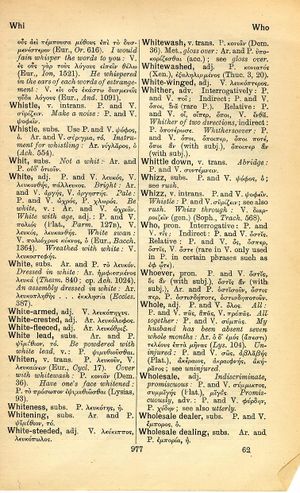who: Difference between revisions
From LSJ
Κινδυνεύουσι γὰρ ὅσοι τυγχάνουσιν ὀρθῶς ἁπτόμενοι φιλοσοφίας λεληθέναι τοὺς ἄλλους ὅτι οὐδὲν ἄλλο αὐτοὶ ἐπιτηδεύουσιν ἢ ἀποθνῄσκειν τε καὶ τεθνάναι → Actually, the rest of us probably haven't realized that those who manage to pursue philosophy as it should be pursued are practicing nothing else but dying and being dead (Socrates via Plato, Phaedo 64a.5)
(CSV5) |
m (Woodhouse1 replacement) |
||
| Line 1: | Line 1: | ||
{{Woodhouse1 | {{Woodhouse1 | ||
|Text=[[File:woodhouse_977.jpg|thumb|link={{filepath:woodhouse_977.jpg}}]] | |Text=[[File:woodhouse_977.jpg|thumb|link={{filepath:woodhouse_977.jpg}}]] | ||
===pronoun=== | |||
Interrogative: P. and V. | Interrogative: [[prose|P.]] and [[verse|V.]] [[τίς]]; | ||
Indirect: P. and V. [[ὅστις]]. | Indirect: [[prose|P.]] and [[verse|V.]] [[ὅστις]]. | ||
Relative: P. and V. ὅς, [[ὅσπερ]], [[ὅστις]], V. [[ὅστε]] (rare in V. only used in P. in certain phrases such as | Relative: [[prose|P.]] and [[verse|V.]] [[ὅς]], [[ὅσπερ]], [[ὅστις]], [[verse|V.]] [[ὅστε]] (rare in [[verse|V.]] only used in [[prose|P.]] in certain phrases such as ἐφ' ᾧτε). | ||
}} | }} | ||

